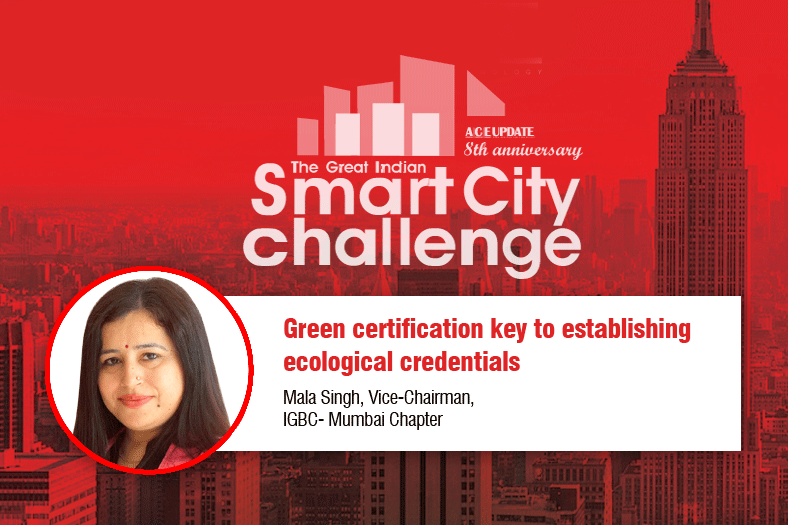Green certification key to establishing ecological credentials

Government’s energy drive and increasing awareness about living greener has spurred movement towards green buildings. The eco-friendly buildings not just create environmental awareness but also make citizens more responsible towards conserving environment. Investment in green building development also helps transform the existing communities into socially responsible communities. Green buildings are emerging as wiser choice for potential buyers given that they are instrumental in harmonising development and environment as well as support enhancement of future generation, says Mala Singh, Vice-Chairman, IGBC- Mumbai Chapter.
What is the process of IGBC certification?
Green building certification establishes green credentials of any project and marked efforts towards environmental sustainability, recognising the project and its developer as ecologically responsible. Established by Confederation of Indian Industry (CII), IGBC (Indian Green Building Council) Certification is one of the foremost recognition platforms for green buildings in India.
IGBC Certification process is well-established, stream-lined and quality conscious. Each rating system has a reference guide, along with a list of addendums for the same mentioned on the IGBC website. Your project must be documented for the said credits and sent to IGBC for the required rating level. Each project is reviewed by third-party auditors to ensure unbiased, factual rating. IGBC also has a list of green building consultants that ensure valued services. Some of the consultants are certified as Premiere whose credentials are proven on the basis of their performance to handle green building projects and quality documentation. Green building rating brings together a host of sustainable practices and solutions to reduce environmental impacts. These rating systems comprise of a point system attributed to various credit requirements- some mandatory while others with point weightage. Once registered, any developer can go for pre-certification to ensure the quality of design, materials and technologies with respect to sustainability. Pre-certification process defines holistically; the overall performance of sustainability aspects of design and planning, also ensures commitment of the decision makers to use sustainable material and technologies and also use of sustainable construction management practices throughout the development process and then given the targeted rating- Silver, Gold or Platinum- as applicable. Pre-certification can be used to avail the benefits of government incentives or other fiscal benefits, if any. IGBC also monitors the ground compliance every six months; throughout construction. Final certification is awarded to a builder only after ensuring the quality of submitted documents through third party assessor. A site visit is conducted by IGBC to validate all compliances, on ground, before awarding the certification. A certificate and plaque is awarded to the developer to recognise their efforts towards sustainability and also, such kind of developers and corporates/government organisations are honoured during the IGBC Annual International Green Congress.
Green building design and corresponding certification proves an integrated approach considering life cycle impacts of the resources used.
What are the different rating systems?
IGBC rating brings together a host of sustainable practices and solutions to reduce environmental impacts. These rating systems comprise of a point system attributed to various credit requirements- some mandatory while others with point weightage. All the IGBC rating systems are voluntary, consensus based, market-driven building programmes. The rating systems are applicable to all five climatic zones of India. IGBC rating programmes have become National by Choice and Global in Performance.
The rating systems are diverse and flexible according to project type and function. The different rating systems by CII IGBC are – Green New Buildings, Green Existent Buildings, Green Homes, Green Affordable Housing, Green Residential Societies, Green Interiors, Green Healthcare, Green Schools, Green Factories, Green Data Centres, Green Campus, Green Townships, Green Villages, Green Cities, Green SEZs, Green Landscape Design, Green Health & Well Being, Green Resorts, Net Zero Buildings, Green Mass Rapid Transport.
What benefits do developers or end users get from getting their buildings certified as green?
Green building is one which uses less water, optimises energy efficiency, conserves natural resources, generates less waste, provides healthier spaces for occupants, as compared to a conventional building”. It also encourages recycling and reuse of resources which finally leads to conserving natural resources, reducing carbon footprint, and also helps mitigate impact of global warming and greenhouse gas emissions. Green buildings not only perform better than conventional buildings considering efficient resource usages and better quality of life, but also provide financial gains to the owners/ occupants throughout the entire building operation and lifecycle of the project. Apart from financial benefits of government incentives, when builders go green, their market image is set as a green and responsible developer.
What does IGBC do to ensure ground compliance?
IGBC monitors its registered and pre-certified projects throughout the project development process till final certification is awarded. Projects have to submit a site compliance report during construction every six months, to prove green construction management practices. IGBC conducts two audits – one during construction and the other before certification – to ensure ground compliance. A building is granted final certification after it is completed and ready for occupancy. During these audits, all installed systems are checked for capacity, efficiency and functioning.
What are the challenges green consultants face during green building certification in Mumbai?
Prime Minister’s Smart City mission has ushered in positive movement in the space of infrastructure. State governments are bullish on green building developments providing incentives to the builders and consumers. However, lack of awareness about the concept of green buildings in the common man needs to be addressed so as to transform consumer into being responsible and making the demand of green buildings market-driven process. Green buildings are currently only 2-5 per cent of the total building footprint in the country. Some developers and corporates are using green building concept as part of their social responsibility and opting for green building certification. Still, there are many conventional-minded developers who consider the green building concept as an enforced obligation. This mindset must be changed to assure sustainable development for our generations. Optimistically, I believe they will be a part of the mainstream responsible developers very soon.
IGBC rating brings together a host of sustainable practices and solutions to reduce environmental impacts.
Mala Singh, Vice-Chairman, IGBC- Mumbai Chapter
16
Cookie Consent
We use cookies to personalize your experience. By continuing to visit this website you agree to our Terms & Conditions, Privacy Policy and Cookie Policy.








